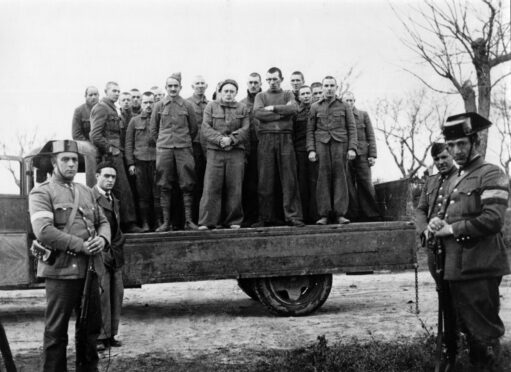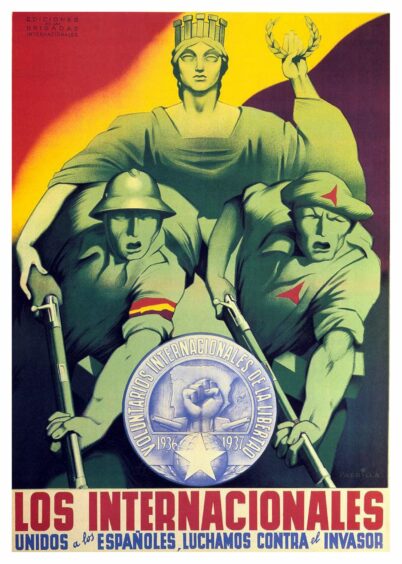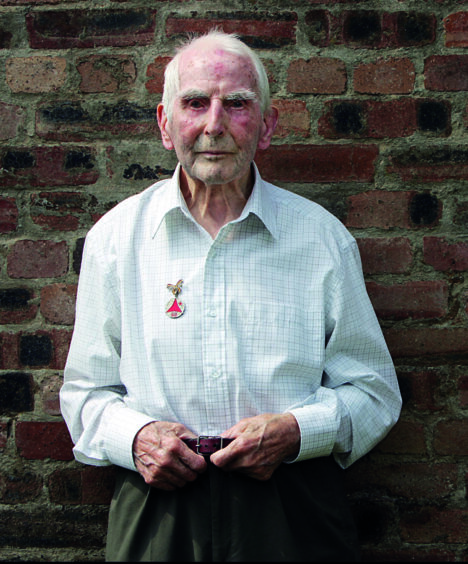
Alone, cut off from their comrades, out of ammunition and surrounded, they waited in the dark on Suicide Hill.
Exactly 86 years ago last Sunday, four young Scots of the XV International Brigade were among the brave Republican fighters who – despite being out-gunned and out-numbered three-to-one – managed to hold the hill and slow the advance towards Madrid of dictator General Francisco Franco’s fascist forces.
But the battle of Jarama, from which they eventually had to retreat, was the one of the bloodiest of the Spanish civil war, claiming 15,000 lives – 10,000 of them on the Republican side.
Although Scots – James Maley, Geordie Watters, Donald Renton and Archibald Campbell Williams, known as AC – managed to survive, two days later on February 14 the four members of Machine Gun Company No. 2 were captured with their comrades and imprisoned, suffering horrendous brutality and witnessing unimaginable horrors during three months of captivity.
The story of the four brave friends is now being told in their own words, and those of their children, in a new book – Our Fathers Fought Franco. Its editor – Professor Willy Maley, son of James who was 28 when he went to war – told The Post: “There’s never been a book like this. There have been oral histories and memoirs of individuals who fought, but never a biography of a whole group who fought together and whose fight ended with them sharing the same prison cell.”
Maley says the book is a unique piece of working class history that explores the poverty and deprivation that politicised the four young men – members of the Communist Party – and led them to Spain, later to be blacklisted and spied on by MI5.
The professor of English Literature at Glasgow University whose father was one of the 520 Scots who joined the International Brigades – said he was a stoic man of few words who later told his family: “There was no good speaking of the menace of fascism and not going to fight it myself.”
Maley said: “When he went into battle on the first day he said men were just falling down dying beside him without firing a shot. They lost half the battalion that day. It was an extremely costly battle but they did hold the line. Jarama was a crucial engagement.”
He described seeing archived news footage of his father after he was taken prisoner with his three comrades, as “profoundly moving and humbling”. And he added: “They had all been captured at Jarama, tagged with the same wire, prodded along by the same men on horseback, put in the same lorry, and taken to the same prison.
“In one interview my father talks about a man’s brains being blown out in front of them. They expected to be next. They knew people were being taken away and interrogated and lived with that daily threat of death.”
Released in a prisoner exchange and sent home via France, Maley explained: “Donald and Geordie knew each other before the Spanish Civil War, and had been in protests together against Oswald Mosley’s Black Shirts. They met my father and AC Williams in Spain.
“AC had gone to Spain while his wife was pregnant. His daughter was born while he was in prison. She is called Rosemary in remembrance because he was missing presumed dead when she was born (Rosemary is an ancient symbol of remembrance).
“He kept a secret diary in prison and risked being shot if it was discovered. Geordie was an important activist in the 1930s. He rescued several wounded comrades during the Spanish Civil war and was a reported as a hero in Spain. Don was a political commissar. If this had been found out he would have been executed.”
After their return to the UK, Renton, of Portobello, went on to become a well-known Labour leader in Edinburgh and a town councillor. Watters, from Prestonpans, became chairman of the National Miners Union and Williams, after a lifetime of adventure, became a contented grandfather at home his Renfrewshire cottage.
Blood brothers with a bond borne out of trauma, they were part of a tight and insular group who would for the rest of their lives meet at International Brigade events in Scotland and England. James Maley was the last of the old comrades to die in 2007 at 99.
His son says the book would not have been possible without his co-authors, Watters’ son Tam, a former coalminer, camera sales adviser and Scottish weightlifting champion, Renton’s daughter Jennie, an Edinburgh-based second-hand bookseller and freelance publisher, and William’s Lancashire-based granddaughter Lisa Croft.
He said: “After our fathers died new information came out. MI5 files (on them) opened up, newsreels were made available, digitisation and the online archive meant we suddenly found new material. We have been able to tell their stories in a way that they couldn’t.”
Our Fathers Fought Franco, edited by Willy Maley, is published by Luath with going to the International Brigade Memorial Trust.

Enjoy the convenience of having The Sunday Post delivered as a digital ePaper straight to your smartphone, tablet or computer.
Subscribe for only £5.49 a month and enjoy all the benefits of the printed paper as a digital replica.
Subscribe © Alamy Stock Photo
© Alamy Stock Photo © Ian MacNicol
© Ian MacNicol